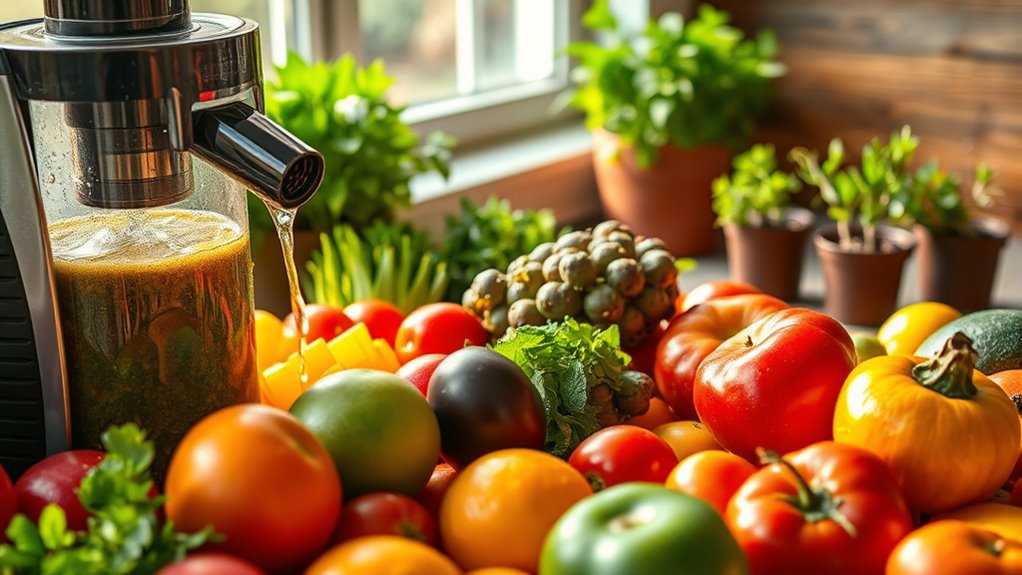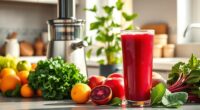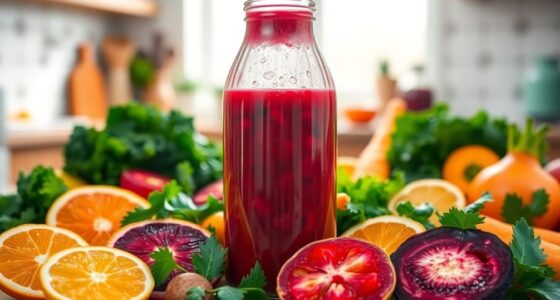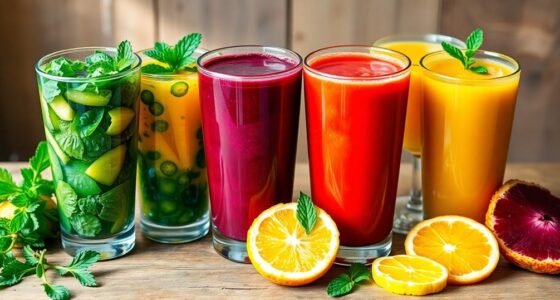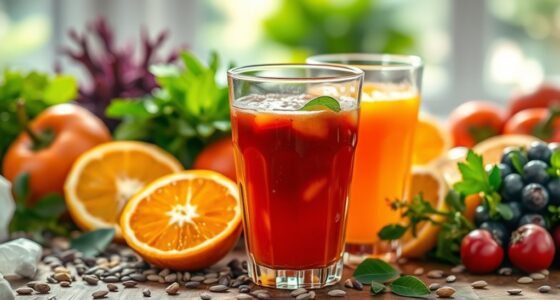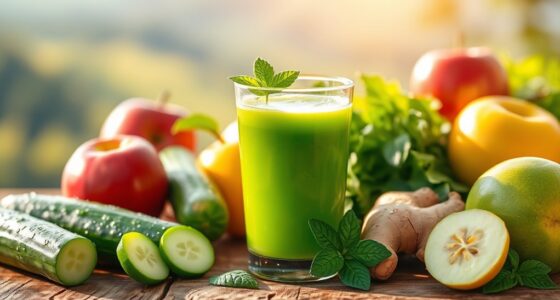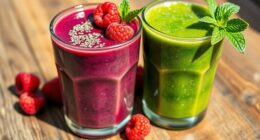Juicing’s power for your gut health is remarkable! It boosts beneficial gut bacteria, lowers inflammation, and provides essential nutrients like vitamin C and antioxidants. Juices, especially from fruits like pomegranates and tart cherries, support your mood and cognitive function. Plus, they can improve sleep quality and reduce stress. There’s so much more to uncover about juicing and its transformative effects on your health journey. Keep going to discover even more gems in the world of juicing!
Key Takeaways
- Juicing enhances beneficial gut bacteria, crucial for improved digestion and overall gut health.
- Regular fruit and vegetable juices lower inflammation, reducing stress and anxiety levels.
- Nutrient-rich juices boost neurotransmitter production, positively impacting mood and cognitive function.
- Tart cherry juice improves sleep quality, which is vital for emotional stability and gut health.
- Joining a juicing community fosters support, recipe sharing, and education on gut health benefits.
The Science Behind Juicing and Gut Health
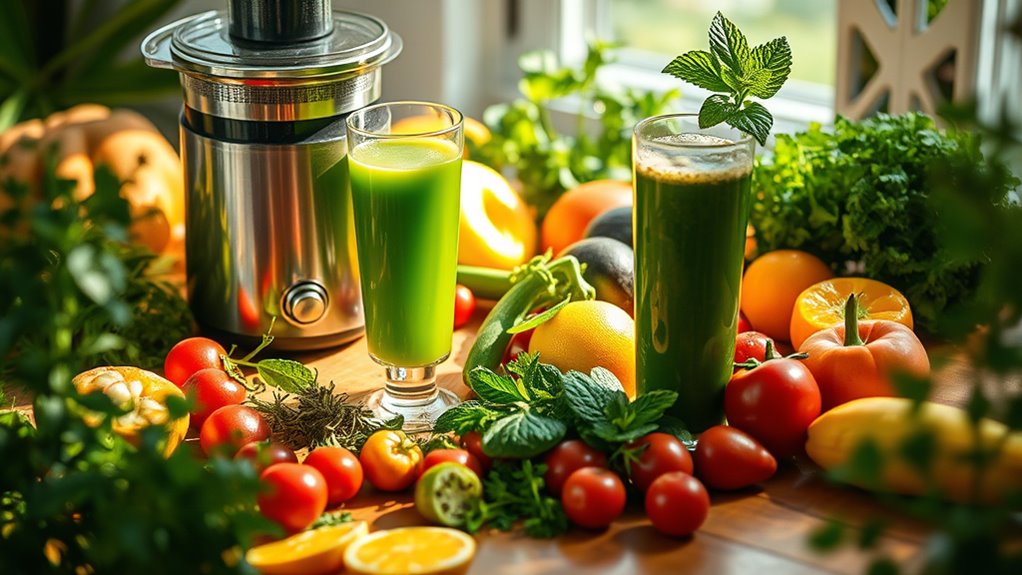
Juicing isn’t just a trend; it’s backed by science that highlights its positive effects on gut health. A 2017 study found that a 3-day juice cleanse boosts beneficial gut bacteria, essential for maintaining a balanced diet.
Regularly consuming fruit and vegetable juices can also lower the risk of Alzheimer’s disease, showing how juicing supports cognitive function. For cardiovascular health, kale juice improves coronary artery disease risk factors, while grape juice flavonoids enhance circulation by promoting nitric oxide release.
Tart cherry juice isn’t just for recovery; it also improves sleep quality, demonstrating juicing’s wider benefits. By incorporating these juices into your routine, you can nourish your gut and overall health, making a significant impact on your well-being. Additionally, juices like pomegranate juice are rich in antioxidants that further support gut health and reduce inflammation.
Juicing for Emotional Well-Being
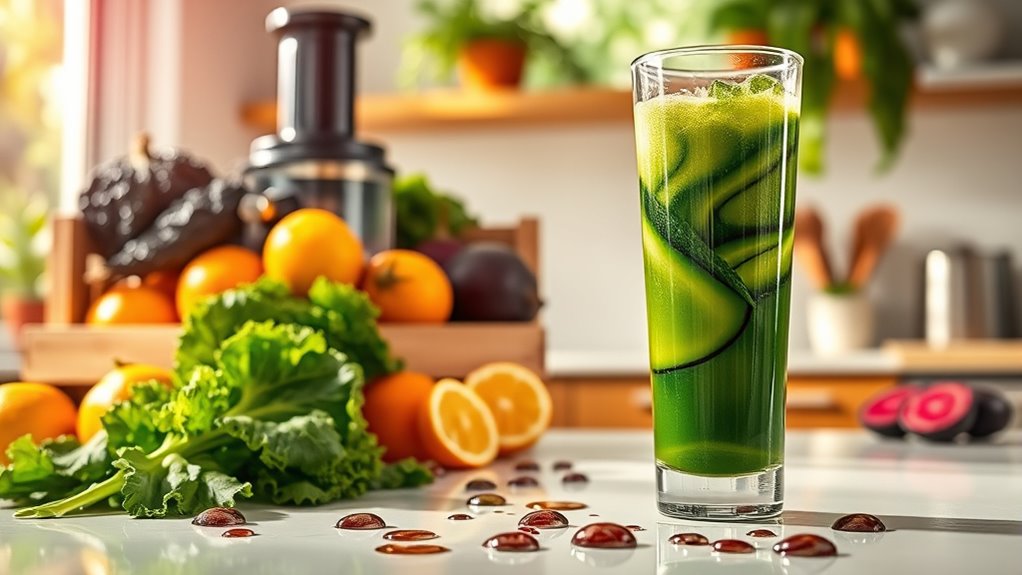
While many people associate juicing with physical health benefits, it can also play an essential role in enhancing your emotional well-being. By promoting gut health, juicing supports a healthy microbiome linked to improved mood and cognitive function.
For instance, tart cherry juice can help you sleep better, which is vital for maintaining emotional stability. Additionally, incorporating fruit and vegetable juices reduces inflammation, a key contributor to stress and anxiety.
Juicing provides essential nutrients that aid neurotransmitter production, directly impacting your mood and emotional responses. By focusing on gut health through juicing, you may alleviate symptoms of emotional distress, showcasing the powerful connection between your physical and mental well-being.
Juicing nourishes neurotransmitter production, enhancing mood and emotional health through a balanced gut microbiome.
Moreover, adding tropical fruits to your juice blends can enhance flavor profiles and nutritional value, further supporting your emotional health journey. Embrace juicing as a holistic approach to emotional health!
Debunking Myths: Juicing and Microbiota
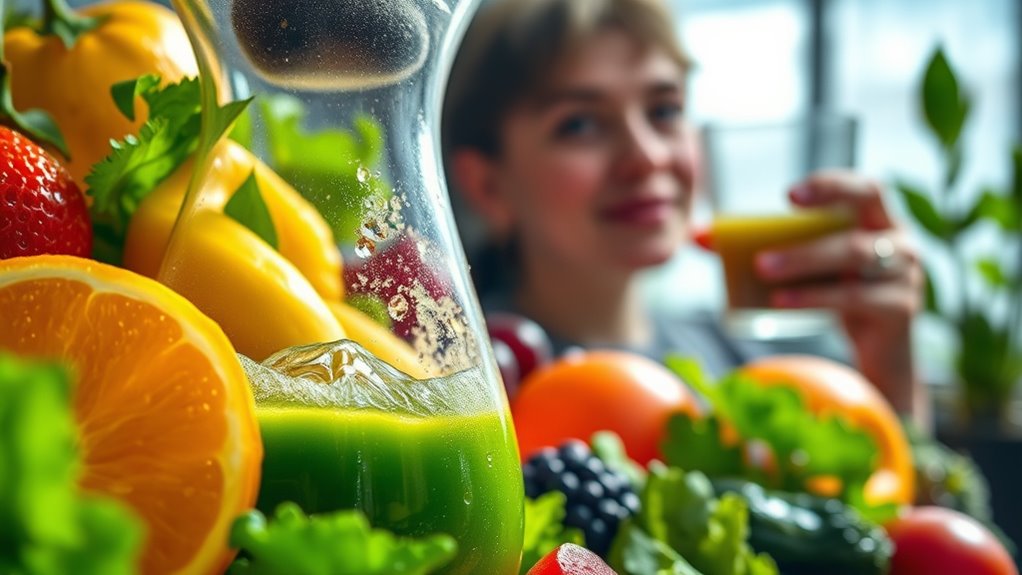
Many people find themselves skeptical about the effects of juicing on gut health, often influenced by myths that circulate in health discussions.
However, research shows that a 2017 study found a 3-day juice cleanse can markedly boost beneficial gut bacteria. Contrary to fears from some studies, most evidence supports juicing as a positive force for gut health and cognitive function.
While you might notice temporary changes in your microbiome with dietary shifts, long-term juicing benefits your gut and overall well-being. Regularly enjoying fruit and vegetable juices is linked to reduced inflammation and a lower risk of cognitive decline.
The Juice Guru Institute emphasizes the need for accurate information to dispel these misconceptions about juicing’s impact on microbiota. Additionally, incorporating anti-inflammatory breakfasts can further enhance gut health and overall wellness.
Key Nutrients in Juicing for Optimal Health
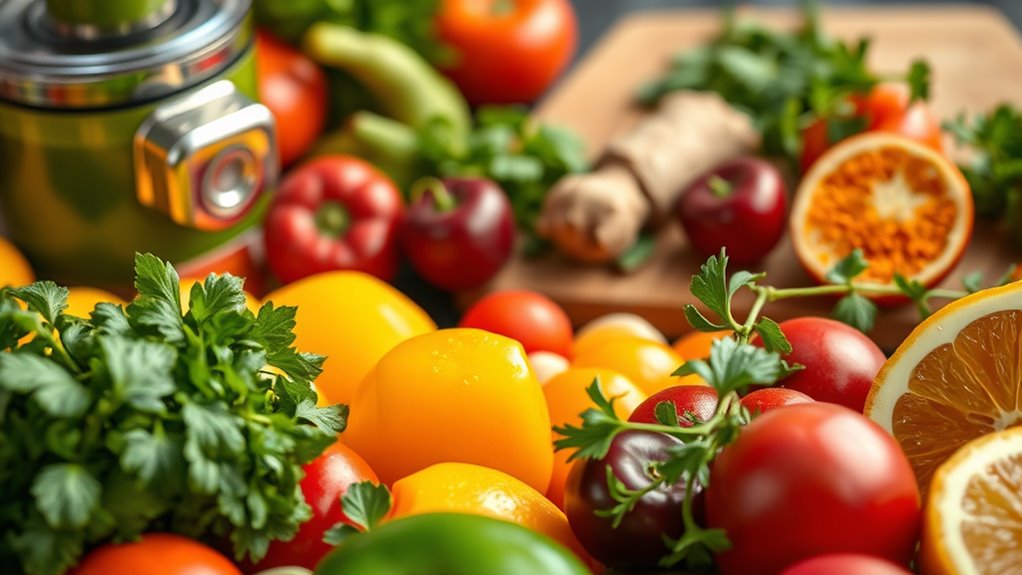
When you juice, you pack in essential vitamins and minerals that boost your immune system and skin health. The antioxidants and phytochemicals from fruits and veggies not only support cardiovascular health but also enhance your overall well-being. Additionally, certain juices like beet juice may improve blood flow, contributing to better nutrient absorption in the gut.
Essential Vitamins and Minerals
Juicing serves as a powerful way to boost your intake of essential vitamins and minerals, which play an important role in maintaining overall health.
When you enjoy juices from citrus fruits, you’re getting a concentrated source of vitamin C, supporting your immune function and skin health.
Leafy greens like kale and spinach provide important vitamin K and magnesium, essential for bone health and muscle function.
Carrot and sweet potato juices deliver beta-carotene, which your body converts to vitamin A for vision and skin health.
Beet juice is rich in folate, necessary for DNA synthesis, especially important during pregnancy.
Plus, by incorporating a variety of juices, you enhance your potassium intake, which regulates blood pressure and supports cardiovascular health.
Additionally, green juices are rich in antioxidants, aiding in detoxification and reducing inflammation.
Antioxidants and Phytochemicals Benefits
Antioxidants and phytochemicals play an essential role in your overall health, and consuming juices packed with these nutrients can offer significant benefits.
Antioxidants like vitamin C and flavonoids combat oxidative stress and reduce inflammation, promoting wellness. Phytochemicals, such as carotenoids and polyphenols, are linked to lower risks of chronic diseases, including certain cancers and heart disease.
Regularly enjoying antioxidant-rich juices can even enhance cognitive function, potentially lowering Alzheimer’s disease risk. Juices made from superfoods like kale and tart cherries are especially beneficial for heart health and muscle recovery.
Additionally, the combination of these nutrients supports gut health by fostering a balanced microbiome, crucial for digestion and overall well-being. Cranberry juice consumption may also provide antioxidant benefits, though its impact on kidney health is still being studied.
The Role of Juicing in Reducing Inflammation
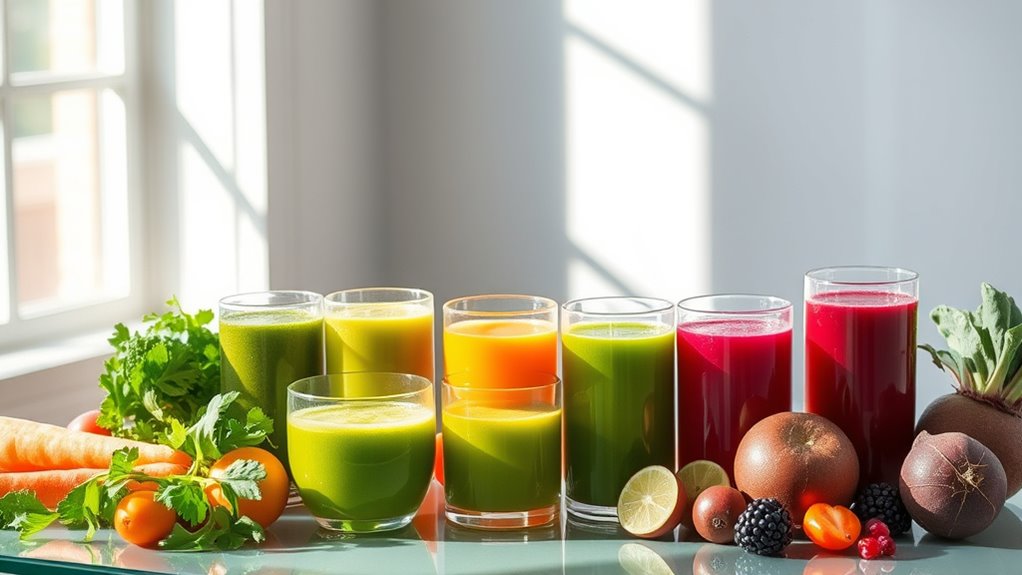
Juicing can be a powerful tool in reducing inflammation thanks to its anti-inflammatory nutrients.
Ingredients like kale and tart cherry not only support gut health but also help lower inflammation markers in your body.
A short juice cleanse might just give your system the boost it needs to manage inflammation effectively. Additionally, incorporating ingredients rich in anti-inflammatory nutrients can further enhance the benefits of your juice regimen.
Anti-Inflammatory Nutrient Power
When you include ingredients like kale and tart cherry in your juices, you’re harnessing powerful anti-inflammatory properties that can greatly reduce inflammation markers in your body.
Studies have shown that regular consumption of these juices can lower your risk of chronic inflammatory conditions, such as coronary artery disease and Alzheimer’s disease.
Grape juice, packed with flavonoids, enhances nitric oxide release, improving circulation and alleviating inflammation-related symptoms.
Additionally, a three-day juice cleanse can increase beneficial gut bacteria, essential for managing inflammation and supporting gut health.
By incorporating these nutrient-rich juices into your diet, you not only boost your physical wellness but also positively impact your cognitive function and emotional health.
Moreover, a juice cleanse can lead to quick weight loss due to reduced food intake, further promoting overall health benefits.
Embrace juicing to tap into these remarkable anti-inflammatory benefits!
Juice Cleanse Benefits
While you might think of juice cleanses primarily for detoxification, they also play an essential role in reducing inflammation in your body. A 2017 study found that a 3-day juice cleanse boosts beneficial gut bacteria, which helps combat inflammation.
Regularly sipping on fruit and vegetable juices can lower inflammatory markers, leading to significant health benefits. For instance, tart cherry juice is effective for muscle recovery, reducing exercise-induced inflammation.
Kale juice has shown promise in improving risk factors for coronary artery disease, often linked to chronic inflammation. Additionally, the flavonoids in grape juice enhance nitric oxide release, promoting better circulation and further reducing inflammation throughout your cardiovascular system.
Incorporating organic fruits and vegetables into your juices can maximize their anti-inflammatory properties and overall health benefits.
Embracing juice cleanses can be a powerful strategy for your overall health.
Juicing as a Pathway to Improved Cognitive Function
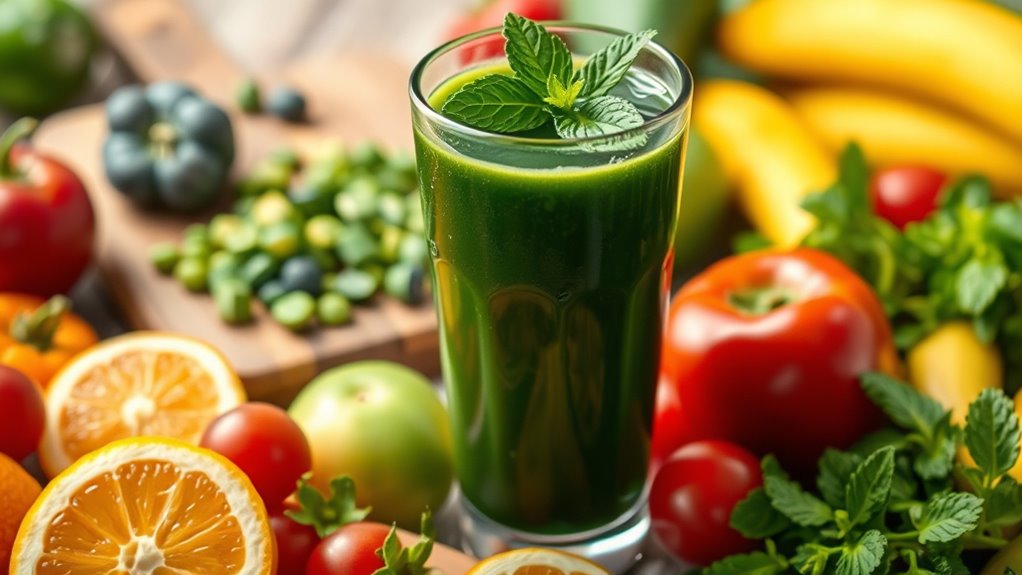
Incorporating fruit and vegetable juices into your diet can greatly enhance cognitive function, especially as research highlights their potential to reduce the risk of Alzheimer’s disease. Regularly sipping on fresh juices may be your ticket to better brain health.
A 2017 study found that a 3-day juice cleanse boosts beneficial gut bacteria, which is essential for cognitive support. Kale juice improves circulation, indirectly benefiting your brain health. Plus, the flavonoids in grape juice enhance nitric oxide release, improving blood flow to your brain.
Juicing also reduces inflammation, a major factor in cognitive decline and neurodegenerative diseases. Additionally, incorporating cold-pressed vegetable juice into your routine can maximize nutrient retention and support overall brain health. So, grab your juicer and start blending those brain-boosting ingredients for a sharper mind!
Creating a Balanced Juicing Routine
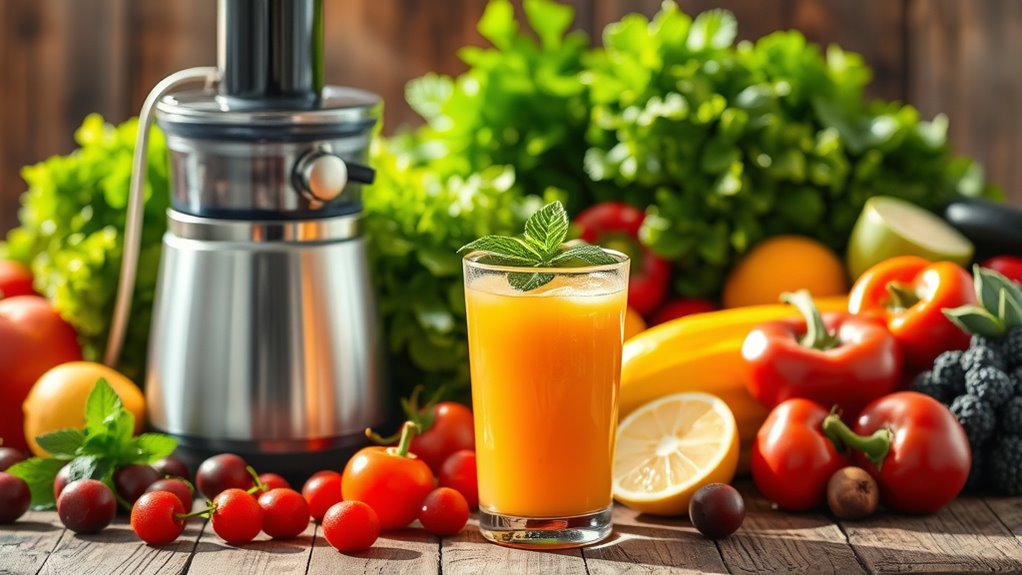
Boosting cognitive function through juicing sets a solid foundation for your overall health, but it’s important to create a balanced juicing routine to maximize benefits for your gut. Here’s how you can achieve that:
- Variety is Key: Incorporate a mix of fruits and vegetables to guarantee you get a wide range of nutrients.
- Leafy Greens Matter: Add dark leafy greens like kale for cardiovascular support and improved gut health.
- Timing Counts: Enjoy morning juices for a metabolism kickstart, and evening ones to aid digestion before bed.
- Mind Your Portions: Balance your juices with whole fruits and veggies to maintain fiber intake and avoid excessive sugar.
Community Support: Sharing Knowledge and Recipes
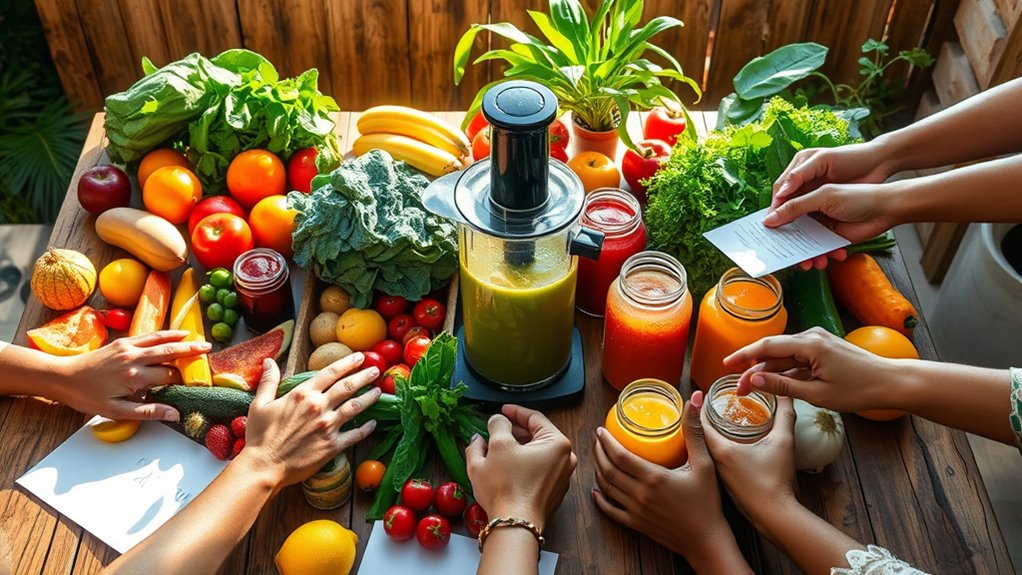
Joining a community can greatly enhance your juicing journey, making it easier to share knowledge and recipes with like-minded individuals. The Juice Rebels Community, created by the Juice Guru Institute, is a fantastic platform to connect with others interested in juicing’s health benefits. Engaging with health professionals fosters evidence-based discussions and deepens your understanding of gut health.
Here’s a quick overview of what you can gain from the community:
| Benefit | Description | Action |
|---|---|---|
| Recipe Sharing | Exchange diverse nutrient-rich juice recipes | Post your favorites |
| Educational Webinars | Attend sessions on juicing’s health impacts | Sign up for upcoming events |
| Research Insights | Access the latest studies on juicing benefits | Read and discuss findings |
| Community Support | Connect with fellow juicers | Join group discussions |
| Personal Experiences | Share and learn from each other’s journeys | Contribute your story |
Frequently Asked Questions
Which Juice Is Best for Gut Health?
When it comes to the best juice for gut health, kale juice stands out due to its ability to improve cardiovascular health, which is closely linked to gut well-being.
You might also want to try tart cherry juice, as it’s great for muscle recovery and sleep quality, both essential for digestion.
Regularly sipping on grape juice can enhance circulation, promoting better nutrient delivery to your gut.
Ultimately, variety is key, so mix it up!
What Is the Fastest Way to Restore Gut Health?
Imagine feeling bloated and sluggish, desperate for relief.
To restore your gut health quickly, start by incorporating a variety of juices into your diet. Focus on green juices with ingredients like kale and spinach, which boost beneficial bacteria.
Add tart cherry juice for muscle recovery and sleep support. Don’t forget grape juice for improved circulation.
These choices can help you feel revitalized and balanced, enhancing your overall well-being in no time.
Can Juicing Heal the Gut?
Yes, juicing can help heal your gut. By incorporating fresh fruit and vegetable juices into your diet, you promote beneficial gut bacteria and reduce inflammation, which is essential for a healthy digestive system.
While juicing temporarily alters your microbiome, the long-term benefits outweigh these changes. You’ll not only support your gut but also boost cognitive function.
Who Is the Leading Expert on Gut Health?
Imagine a superhero in a lab coat, wielding a stethoscope like Thor’s hammer—meet Dr. Alessio Fasano, the leading expert on gut health.
He’s not just saving the day; he’s unraveling the mysteries of the gut microbiome and its impact on our overall well-being.
With his groundbreaking research and holistic approach, you’ll find insights that’ll transform how you think about your gut.
Conclusion
Juicing isn’t just a trend; it’s a gut health revolution that can transform your life! By harnessing the power of fresh fruits and veggies, you’re not only nourishing your body but also boosting your mood and cognitive function. With the right balance and community support, you’ll discover delicious recipes that make gut health feel like magic. So grab your juicer and plunge into this vibrant journey—your gut will thank you, and you might just feel like a superhero!
Cindy thoroughly researches juicing trends, techniques, and recipes to provide readers with practical advice and inspiration. Her writing style is accessible, engaging, and designed to make complex concepts easy to understand. Cindy’s dedication to promoting the advantages of juicing shines through her work, empowering readers to make positive changes in their lives through the simple act of juicing.

